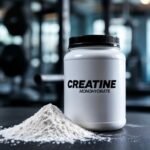Want to boost your workout performance and muscle growth? Find out 6 best known workout supplements that can help you reach your goals.
Building muscle is not just about lifting weights, it is also about giving your body the right fuel to perform and recover. That is where workout supplements come in. From a simple cup of coffee to protein shakes and creatine, many people use these to get stronger, recover faster, or train a little harder. But with so many options out there, it is natural to wonder, do they really work, or are they simply overhyped? Some supplements are backed by solid science and can genuinely support your fitness goals when used the right way. Here, we break down six of the most popular ones, such as creatine, protein powder, beta-alanine, caffeine, BCAAs, and HMB.
How is creatine helpful for muscle growth?
It works by replenishing your body’s energy stores (ATP), which means your muscles can perform better during short, high-intensity workouts like weightlifting or sprinting. This extra energy not only helps you push harder in the gym but also supports quicker recovery, allowing for consistent training and better overall progress. Among all types, creatine monohydrate is the most popular and is known for being both safe and highly effective, even when taken for several years, as per a study published in Ophthamology.
When used correctly, creatine can significantly boost muscle size, strength, and workout performance. The recommended dose is 3–5 grams daily, with or without food. For best results, most people take it around their workouts, either before, after, or both. Remember to stay hydrated while taking this supplement. It may cause water retention in muscles as well.
Is protein powder essential for building muscle?
Protein powder has become a go-to supplement for fitness enthusiasts, mainly because it makes meeting daily protein needs simple and convenient. Protein is essential for repairing muscles after training and supporting new muscle growth, which is why many athletes and gym-goers rely on it. Different types of protein powders are available – whey and casein (both milk-based), soy, pea, rice, hemp, and even egg protein. Each has its own benefits, but whey protein remains the most popular thanks to its fast absorption and complete amino acid profile.
Beyond muscle growth, research also highlights other benefits. A 2019 study published in Nutrients found that women who consumed an additional 40 grams of whey protein daily saw a noticeable reduction in abdominal fat compared to those taking other protein supplements. For best results, aim for 20–30 grams per serving, one to two times a day, whether post-workout, between meals, or as a quick meal replacement.

Can beta-alanine help you train harder?
Beta-alanine is a non-essential amino acid naturally made in the liver and found in foods like meat and poultry. As a supplement, it is popular among athletes because it helps buffer lactic acid buildup during exercise, the culprit behind muscle burn, fatigue, and slower recovery. By delaying this fatigue, beta-alanine allows you to train harder for longer, making it especially useful for high-intensity workouts like sprinting, lifting, or interval training.
A study in the Journal of Strength and Conditioning Research found that athletes who took 4 grams of beta-alanine daily for 8 weeks gained more lean muscle mass than those given a placebo. The recommended dose is 4–6 grams per day, best taken with meals in smaller splits to reduce tingling sensations.
Is caffeine the most easily accessible workout supplement?
When it comes to accessible workout supplements, caffeine easily tops the list, and coffee is the simplest way to get it. Affordable, widely available, and naturally rich in antioxidants, coffee provides a quick energy boost before training. According to the International Society of Sports Nutrition, caffeine is one of the most effective and well-studied ergogenic aids, shown to improve both strength and endurance performance.
It increases muscle strength and power, better aerobic capacity, enhances sprinting and jumping performance, and even improves focus during workouts. Caffeine also helps spare glycogen stores by encouraging the body to burn fat as fuel, making it especially useful for endurance activities. A moderate dose before exercise may be enough to unlock these performance-boosting effects.
Are BCAAs worth it for muscle growth?
Branched-chain amino acids (BCAAs), like leucine, isoleucine, and valine, are among the most talked-about supplements for muscle support. They are naturally present in protein-rich foods like eggs, poultry, dairy, fish, and meat, and play a big role in muscle recovery and reducing post-workout soreness. In fact, a study in the journal Nutrients highlights that BCAAs are crucial for growth, making up nearly 35 percent of the amino acids found in your muscles.
That said, the real impact of BCAAs depends on your diet. If your protein intake is already sufficient, additional BCAA supplements may not add much value. But for those eating less protein, whether due to diet restrictions or during calorie cuts, they can be a helpful boost. A typical dose ranges from 5–10 grams before or after workouts.
Also read: Best pre-workout supplements to energise you
What is HMB, and does it really help with muscle growth?
HMB (beta-hydroxy-beta-methylbutyrate) is a compound made from the amino acid leucine, one of the key building blocks of protein. Its main role is to slow down muscle breakdown and support faster recovery, making it particularly useful for beginners, people returning to training after a break, or anyone increasing workout intensity. Some supplements even combine HMB with creatine, which may further boost muscle gains and reduce the risk of overtraining.
A 2017 review in the Journal of Cachexia, Sarcopenia and Muscle found that untrained adults who took 3–6 grams of HMB daily saw greater increases in lean muscle mass from resistance training compared to those who did not. The typical recommended dose is 3 grams per day, often taken alongside creatine for maximum effect.








